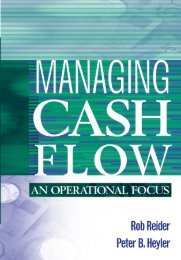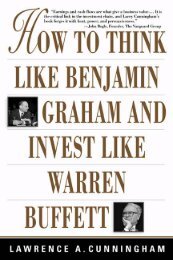The Art of Day-Trading: Table of Contents
The Art of Day-Trading: Table of Contents
The Art of Day-Trading: Table of Contents
You also want an ePaper? Increase the reach of your titles
YUMPU automatically turns print PDFs into web optimized ePapers that Google loves.
<strong>Day</strong>-trading: Not what you think<br />
<strong>Day</strong>-trading: Not what you<br />
think<br />
<strong>The</strong> day-trader is a cross between an extrovert and an introvert with<br />
both characteristics in balance.<br />
<strong>The</strong> introvert aspect is depicted by the disciplined workaholic with<br />
a reclusive concentration. <strong>The</strong> extrovert aspect is depicted by an<br />
aggressive, competitive, self-motivated individual striving to be the best in a selective<br />
pr<strong>of</strong>ession.<br />
If you think you have that Dr. Jekyll/Mr. Hyde personality, then you are invited to explore<br />
my world -- the world <strong>of</strong> the pr<strong>of</strong>essional trader.<br />
I am easy to describe. I have an insane personality that is intermittently interrupted by<br />
craziness. Why else would anyone set up a multi-million dollar trading business in a rural<br />
surrounding in his great-grandfather's farm house, working five 12-hour days a week as<br />
well as a partial six-hour day thrown in on Saturday?<br />
<strong>The</strong> intermittent craziness occurs when I try to find ways to spend the money. A true test<br />
<strong>of</strong> your success is to make more money than your kids can spend with constant spending<br />
influences <strong>of</strong> a "Honey, can I..." wife -- which always means get out the checkbook.<br />
Why do I do it? It's one <strong>of</strong> the last bastions <strong>of</strong> pure capitalism. It gives the same<br />
opportunity to a hillbilly farm boy in bib overalls living in East Sparta, Ohio, as it does to<br />
an Ivy League university graduate in a tailor-made suit on Wall Street.<br />
Each day I am a creature <strong>of</strong> habit, going through a daily ritual before the markets open. I<br />
outline in detail all three possible scenarios for that day: up, down or sideways. I assign a<br />
probability to that scenario and make a written strategy plan, which has been incorporated<br />
into a trading fax service that is devoted to teaching people how to trade. Thus, a<br />
disciplined trading plan is imposed on me.<br />
Every successful trader must be flexible, alert and feisty. <strong>The</strong> flexibility must be used to<br />
shift from being long to being short literally within seconds. <strong>The</strong> alertness is used for<br />
observing price movements that are an aberration from the norm. Feistiness is the savvy<br />
aggressiveness to fight back with a vengeance to regain money you lost. I don't know how<br />
many times I've seen people lose money in the morning and quit. My most pr<strong>of</strong>itable days<br />
are when I lose money in the morning and stay in because I want to get it back.<br />
Once the trading day begins, all <strong>of</strong> my focus is on my quote screen and three markets: S&P<br />
500 Stock Index futures, 30-year T-bond futures and the S&P 100 Index options (OEX).<br />
All day long I record a diary <strong>of</strong> the trading patterns for that<br />
day. This is a ritual I've done for 12 years, and the diaries have<br />
been priceless. Recurring patterns are much more frequent<br />
than people realize, and referring to the diaries has reinforced<br />
the adage, "If you don't know history, you are doomed to<br />
repeat it." <strong>The</strong> diaries clearly show that trading is actually a<br />
composite <strong>of</strong> many ebbs and flows at different times <strong>of</strong> the<br />
day. <strong>The</strong>y have helped me develop the following set <strong>of</strong> daily<br />
trading rules:<br />
1) Do not trade the last hour <strong>of</strong> the day in the S&P futures<br />
market.<br />
<strong>The</strong> probabilities <strong>of</strong> a successful trade diminish in this time<br />
frame due to the impulsive and reckless buying and selling by<br />
institutions just because they didn't get their trading done earlier.<br />
2) If you don't like the trade you're holding,<br />
get out.<br />
This is where my emotions do come to the forefront because I hate to lose. Not liking a<br />
trade simply comes from analyzing in my mind that this "hated" position has more<br />
probability to separate me from my objective <strong>of</strong> making money and must be eliminated.<br />
Have you ever had a feeling <strong>of</strong> relief after exiting a bad trade just because you were out <strong>of</strong><br />
a mess? Losing trades use more mental energy than winning ones.<br />
A day-trader must become very mechanical, almost robotic. Many people who have come<br />
to the <strong>of</strong>fice to observe my trading style have commented that I appear almost emotionless.<br />
I believe to show emotion is to show fear: When your hand is shaking so much you can't<br />
pick up the phone, the market senses a victim is about to be slain and goes out for blood.<br />
This rule has evolved out <strong>of</strong> this fear factor.<br />
3) After two hours <strong>of</strong> trading, ask yourself, "Do I feel good about my trading today?"<br />
Once two hours have passed in the trading day, you should have made at least two, or<br />
perhaps more, trades but enough to evaluate what you have done. If you can answer "yes"<br />
to the question, continue trading. If your answer is "no," stop trading. You can't bring<br />
happiness to a "blue" day by trading. Your emotions won't allow it, and a big losing day is<br />
likely to be the result.<br />
September 1995 is a true example for me <strong>of</strong> turning a bad family health situation into a bad<br />
financial situation. My father suffered a heart attack. He always was the pillar <strong>of</strong> strength<br />
to me, and to see him in intensive care was just too difficult.<br />
Some people drown their problems with alcohol. My escape is trading, but during that<br />
time, my heart wasn't in it: My focus was gone; my energy level was low; my enthusiasm<br />
was non-existent. It turned out to be the worst trading month I had had in seven years.<br />
<strong>The</strong> person who knows you best is yourself. Listen to yourself.<br />
4) All cylinders <strong>of</strong> the engine must be running efficiently.<br />
Keep in mind, as your trading day progresses, what money you have made or lost. It is<br />
much like knowing the score <strong>of</strong> a basketball game when you are the coach. <strong>Day</strong>-trading is<br />
a job, and your paycheck is determined by your ability. You only can maximize your<br />
ability if you have all the information you need to make trading decisions.<br />
If your phone, quote machine or any other mechanical function <strong>of</strong> your daily routine is out<br />
<strong>of</strong> whack, stop trading. Frustration is the best friend <strong>of</strong> a losing day. <strong>The</strong> more frustrated<br />
you are, the less efficient your trading decisions will be, lowering the probability <strong>of</strong> a<br />
winning day. Don't fight a losing battle; there is always another day with opportunities.<br />
5) Have complete faith in your indicators.<br />
This is a must for success. Many times your indicators give a buy or a sell signal, and you<br />
don't follow it because you just don't have the confidence the signal is right this time.<br />
Successful day-traders believe in their indicators but also are aware that nothing is 100%<br />
foolpro<strong>of</strong>.<br />
Not taking a trade that is set up using indicators you have developed is calling yourself a<br />
liar.<br />
<strong>The</strong> indicator is a product <strong>of</strong> you telling yourself to do a trade. When you reject it, you are<br />
responding by saying, "Indicator, you are not giving me a true signal." Grade yourself with<br />
a big red "F," and go sit in the corner.<br />
6) To anyone who aspires to become a day-trader, observe those who are successful.<br />
Any information you can procure on the trading philosophies, mechanics and techniques <strong>of</strong><br />
the pr<strong>of</strong>essionals is well worth your while. If learning from those who have experience<br />
cuts down your learning curve time, isn't it worth it?<br />
I've heard people say they were going to learn by themselves. Learning for yourself will<br />
work if you have the time and financial resources. Stubbornness and pride can be<br />
hazardous to your wealth.<br />
If you do pursue learning from the "masters," do not be surprised to find that there are<br />
many different ways to day-trade pr<strong>of</strong>itably. Do not try to clone another individual,<br />
because your personality is never exactly the same as his. Observe, learn and test the<br />
waters to arrive at the confidence level you will need to achieve consistent success.<br />
7) <strong>Day</strong>-trading is a long-term commitment.<br />
I fervently believe it takes several years to become a true pr<strong>of</strong>essional. Each year you<br />
should become more consistent in your pr<strong>of</strong>its and enjoy more confidence in your<br />
indicators. My final daily rule means taking every trade and dissecting it. This will provide<br />
a roadmap for success by showing you where you have been, which mistakes you can learn<br />
from and which situations to avoid.<br />
<strong>Day</strong>-trading is not easy, but as a business, it can provide the American dream -- financial<br />
independence.<br />
Mark D. Cook is a pr<strong>of</strong>essional trader in East Sparta, Ohio. He has been trading for 22<br />
years and won the 1992 U.S. Investment Championship with a 563% return. Cook <strong>of</strong>fers a<br />
fax advisory service, Mark D. Cook's Trader Fax, www.markcook.com, on S&P and<br />
T-bond futures and OEX options that is structured specifically to teach people to trade<br />
better.<br />
Back to contents page<br />
Copyright © 2000 Futures Magazine Inc.<br />
http://www.futuresmag.com/library/daytrade97/day4.html [5/14/2001 2:46:44 am]




